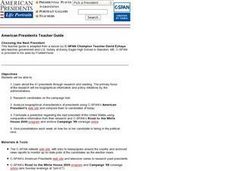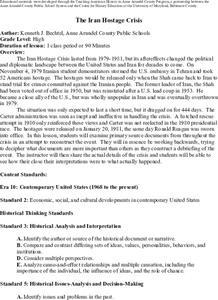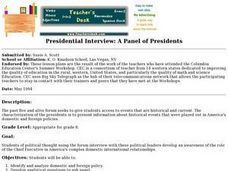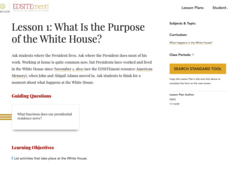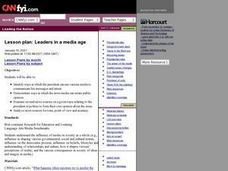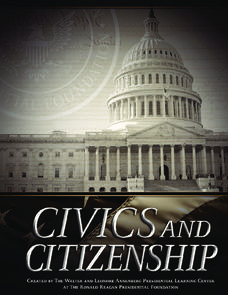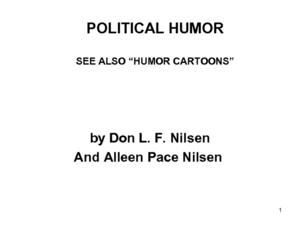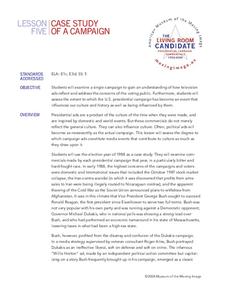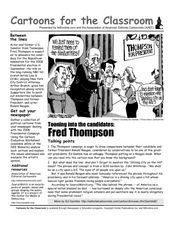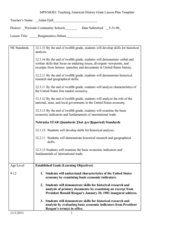University of California
The End of the Cold War (1979-1991)
Scholars use primary and secondary documents, as well as video evidence, to investigate the end of the Cold War. After completing the final installment of an eight-part series, class members better understand the issues surrounding...
Curated OER
Choosing the Next President
Students use comparative Internet research to formulate a prediction regarding the next president of the United States. They give presentations each week on how his or her candidate is faring in the political race.
C-SPAN
Evaluating Historical Presidential Campaign Ads
Political ads flood the airwaves each election cycle. An activity including more than a dozen political ads from iconic presidential campaigns helps learners unpack how the sausage gets made during election "silly season." Using the...
Center for History Education
U.S. Foreign Policy and the Iran-Contra Affair: Was Oliver North a Patriot, a Pawn, or an Outlaw?
If you had to write a song about Oliver North, would it be a ballad or a dirge? If you had to put him on a trading card, would he be a hero or the bad guy? Young historians decide for themselves after examining documents from the...
Curated OER
Students Directed Learning
Students engage in a lesson which facilitates their learning about the history of the American presidency. They create their own lessons based on C-SPAN's American Presidents Timeline poster.
Curated OER
Know Your Presidents
Students research and are able to identify the presidents placing them in chronological order.
Center for History Education
The Iran Hostage Crisis
While the Iranian Hostage Crisis was a watershed moment, few history classes take on the complex series of events leading up to it. Using declassified documents, including a hostage's diary, young historians create their own reports to...
National First Ladies' Library
Presidential Illness: Constitutional Crisis?
Pupils use the internet and other sources to explore incidents where the President of the United States has become incapacitated. They research the reasons for the 25th Amendment, and solutions set in place to solve the problem of...
Curated OER
President Notebook
Students make presidential notebooks which they add to throughout the year. They arrange information about each president into an informational chapter.
Curated OER
Nov. 2, 1976 | Carter Defeats Ford in Presidential Election
After reading about the presidential race in 1976, learners think critically about presidential legacy. They read all of the provided background information, related New York Times articles, and then respond to a writing prompt via blog...
Curated OER
Presidential Interview: a Panel of Presidents
Eighth graders identify and analyze domestic and foreign policy. They develop analytical questions to ask a panel. They develop a sequence of events of each presidential office holder.
National Endowment for the Humanities
Lesson 1: What Is the Purpose of the White House?
Pupils view images of presidents working and living at the White House. They list activities that take place at the White House and discuss the many purposes of the building.
Curated OER
Social Programs and Government Responsibility
Students compare and contrast two Presidents and how viewed the government in times of difficulty. They examine what role each President handled the role of philanthropy during their years in office. They identify acts of philanthropy...
Curated OER
Leaders in a Media Age
Students identify ways in which the president can use various media to communicate his messages and intent. They demonstrate ways in which the news media can create public opinion.
Australian National Schools Network
Civics and Citizenship
What is a good citizen? Here is a fantastic unit of ten lessons that will thoroughly cover the concept of civics and citizenship in your class. Examples of activities include learning stations, primary and secondary source analysis of...
Curated OER
Political Humor
Though slightly dated (around the 2008 Presidential election), the information and discussion points in this presentation about political humor are solid. Use the slides in your language arts class in a lecture about semantics, or in a...
Curated OER
Celebrate Mathematics Awareness Month in Your Class
Learn the history and purpose behind this month dedicated to the exploration of numbers.
Curated OER
Case Study of a Campaign
High schoolers read a case study of one campaign to discover how political campaigns addresses the needs of the voters. In groups, they answer questions related to the case and discuss how the commercials affect society as a whole. They...
Curated OER
Life and Times: Dr. Martin Luther King, Jr. 1929-1968
The life and times of Martin Luther King Jr. are outlined in this simple-yet-informative presentation. This is an image-rich slide show depicting scenes from his personal and public life. A great resource to use with a unit on the civil...
Curated OER
I Do Solemnly Swear: Presidential Inaugurations
Students examine the process of presidential inauguration. They examine and discuss primary source documents and complete worksheets.
Curated OER
Cartoons for the Classroom: Tooning into the Candidates - Fred Thompson
In this current events worksheet, students analyze a political cartoon about about 2008 presidential candidate Fred Thompson. Students then respond to 2 short answer questions.
Curated OER
Reaganomics Debate
Students examine the effectiveness of 'trickle down' economics. In this "Reaganomics" lesson, students use readings, analogies, discussion and debate to understand basic economic concepts. Students will analyze the what they think are...
Curated OER
Separation of Powers
Students examine the roles of each of the branches of U.S. government. In this checks and balances lesson, students watch Discovery video segments and discuss the concept of federalism as they create a school-wide policy for government...
Curated OER
Understanding Alzheimer's Disease
Learners examine what experts have discovered so far about Alzheimer's. They explore how the brain works, and how it changes as we age. They discover things they should do - or not do - to keep their brains healthy.



